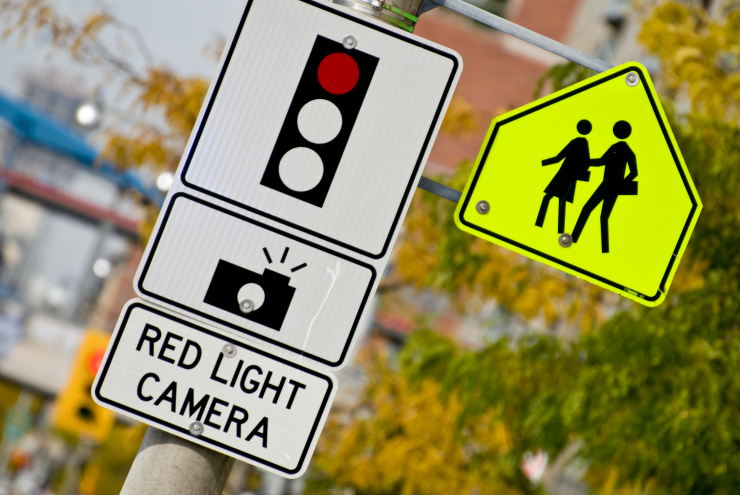
The National Transportation Safety Board took a huge step yesterday when it released a new study identifying speed-related deaths and injuries “as an urgent and under-addressed national problem,” as noted by the Vision Zero Network.
Ten-thousand people are killed every year because of speeding motorists, according to the NTSB study. What’s needed: A multi-modal approach that uses technologies like speed cameras and an end to the outdated approach that sets speed limits at the 85th percentile of speeds.
If cities want to achieve Vision Zero, they should be given more freedom to prioritize safety from the state and federal government.
Among the recommendations in the full report:
- Encourage states and localities to authorize use automated speed enforcement, which is proven to be effective in managing speed, saving lives.
- Revise traditional speed-setting standards to balance 85 percentile approaches with safe systems approach that better incorporates crash history, safety of pedestrians, bicyclists.
- Incentivize state and local speed management activities.
- Incorporate the safe system approach for urban roads to strengthen protection for vulnerable road users.
- Increase federal attention, leadership and funding of speed as a national safety priority.
“For far too long, our speed policies have been stuck in neutral at the expense of thousands of lives each year,” said Leah Shahum, Director of the national Vision Zero Network. “The NTSB study shows the urgency of recognizing speed as an urgent national problem. Local leaders of Vision Zero cities and community members are stepping up to fill a leadership void at the national level to address the dangers of speed.”
The statistics cited by NTSB are additionally devastating.
More than 112,000 people died in speeding-related crashes in the US from 2005 to 2014, averaging over 10,000 deaths annually.
About the same amount of people are killed in speed-related deaths as drunk driving. The economic cost of speed-related deaths is about $52 billion annually.
In Philadelphia, we lose about $1 billion each year in all traffic crashes (speed and otherwise.)
The Bicycle Coalition of Greater Philadelphia has long been advocating for better use of automated enforcement and safety cameras.
Last year, we successfully advocated for an extension to Pennsylvania’s red light safety cameras program. This year, we’ve been working with State Rep. John Taylor to create a speed camera Pilot on Roosevelt Boulevard in Northeast Philadelphia. Roosevelt Boulevard is, by far, the most dangerous roadway in Philadelphia, and one of the most dangerous in the country.
We do not believe speed cameras should be a replacement for better engineering practices. But while the money is raised to reconstruct roadways like Roosevelt Boulevard, speed cameras can help end deaths and injuries now.
As the study noted, too often local leaders and engineers are blocked by state and federal government from implementing safety standards.
Right now, we are working to push speed cameras through the state legislature because the city needs state authority for the program. And at that, Philadelphia legislators largely support (and have co-sponsored) the measure. It’s legislators in other parts of the state who feel speed cameras are an “overreach” and holding our safety hostage.
The NTSB study is also important because it is more proof that speed is a major factor in road deaths throughout the United States, and municipalities that have been given authority to slow down traffic and implement Vision Zero have been successful.

Speed cameras offer impartial, and certain enforcement of the speed limit. No one is immune and everyone that speeds will receive a ticket. It is just and it will save lives.
The NTSB wants every city in the USA to become a for-profit business partner with the for-profit camera companies using a system that will NOT be employed in a way to actually slow most drivers, but will be employed to maximize ticket camera profits. It is a total reversal of the NTSB’s former approach to engineering and education programs designed to actually improve safety in non-abusive ways.
James C. Walker, National Motorists Association
NTSB’s approach on this is unfortunate, as it ignores many basic principles of traffic engineering, which is not some outmoded, discredited area of study, but in fact one that, unlike the NTSB’s philosophy, was guided by science and engineering and not pre-determined, arbitrary opinion. Traffic engineering science is a body of study that led traffic engineers to develop respect for the average motorist, something that is missing in NTSB’s entirely undemocratic and unscientific approach. NTSB’s statements that the 85th percentile rule should not be used to set speed limits, and that they are often set as a compromise to satisfy a political desire for faster travel, are completely false, in my experience. Driving on 4-lane 202 in Chester County, with a posted limit of 55, at 70-75 mph is common in light traffic. And it occurs quite safely. I am not against reasonable speed enforcement, as some motorists do speed and deserve citations. Speed can kill, but what NTSB is not facing up to is the valuable common sense of the average motorist and the need to observe average speeds and take them into account when determining at what speed a citation should be issued. Further, focusing narrowly on speed fails to cause transportation officials to take advantage of all the smarter and less obtrusive ways of promoting traffic safety, including the safety of pedestrians and bike riders. A shotgun approach that begins and mainly focuses on practical means of making us all safer via road design should be the primary philosophy. Instead, NTSB grabs onto the one factor that is most easily measured, takes the smallest number of dollars, and requires the least creative thought or engineering. This is a typical approach of bureaucratic, arbitrary thinkers who have little faith in or understanding of science and the real philosophical underpinnings of democracy, and refuse to be guided by real world experience. Where is their respect for the American public they are supposed to serve?